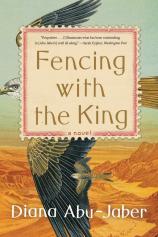Reading Group Guide
Discussion Questions
Fencing with the King

1. FENCING WITH THE KING draws on themes and motifs from King Lear and Arthurian legend. Did you pick up on these references while reading? What events or characters most evoked these mythologies? Does looking at the novel through the lens of those works change or deepen your reading?
2. In what ways can Amani’s experience with the falcon in the opening pages of the book be seen as a metaphor for her journey in Jordan?
3. Abu-Jaber describes characters throughout the novel as “half-in, half-out” (p. 194) or living a “half-life” (p. 129). What do these words mean to you? Do you experience these feelings in your own life? What does this language reveal about the experience of those displaced or living in exile?
4. “It was a part of them, and yet her father didn’t speak of it. Apparently she wasn’t meant to either. And because of this, she wanted to talk about it all the more” (p. 14). Why do parents withhold secrets about their family or family history from their children? Does it ever serve to their benefit or only cause harm? What impact does it have on the secret keeper and the person from whom the information is withheld?
5. Themes of inheritance --- both physical and intangible --- are at the core of this novel. How do Gabe, Hafez and Amani’s understanding of inheritance differ? What do they have in common?
6. Could you relate to Amani’s connection across generations to a grandmother she never met? Do you have a similar connection to someone in your life? What do you have in common?
7. Amani is driven to know the country of her ancestors in hopes that it will hold the key to solving the mystery of her father’s life. Have you been to your family’s country of origin, or hometown? Do you feel it helped you understand your family? Did you feel a connection to the place?
8. The ravages of displacement and generational trauma are powerful themes throughout this book --- particularly in the life of Natalia. What was your understanding of the relationship between Palestine and Jordan before reading this book? How has reading this book expanded or challenged that understanding?
9. Francesca’s outlook is almost the exact opposite of her husband and daughter’s. Amani is driven to hold tight, anchoring herself in the words and belongings of her unknown grandmother. Which perspective do you most relate to?
10. What did you make of the recurring imagery of swords and blades --- from the treasured Il Saif to dull fencing foils?
11. “The caretaker pointed to the stone archway. ‘Ajab means you feel God. Maybe when you see a leaf or a star. Maybe in old things or beautiful things. That’s why we save the old things --- they help us feel God’” (p. 135). What do you think about this perspective on the natural and manmade world? Have you felt a similar feeling before? What triggered it? How might an embrace of a cultural perspective like this influence American society?
12. Were you surprised by Amani’s decision to remain in Jordan? Why or why not?
13. “When he’d returned from Jordan, he’d pulled out his family photograph, the one with the missing corner, and found that the fragment fit exactly into that corner: at last, his three-year old hand closed around the fingers of an older sibling. Now as he compared the boy’s face in the fragment to the newer image, fifty-six years melted away. His breath shook inside his body. How to reclaim a childhood --- how to reclaim a brother” (p. 289)? Do you think this will be possible? What do you think will come next for the Hamdan family?
Fencing with the King
- Publication Date: March 14, 2023
- Genres: Fiction
- Paperback: 320 pages
- Publisher: W. W. Norton & Company
- ISBN-10: 1324050314
- ISBN-13: 9781324050315







